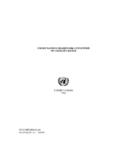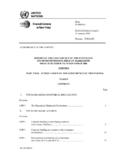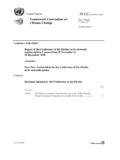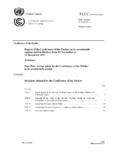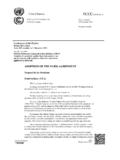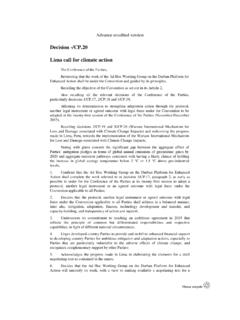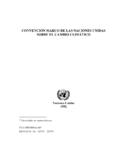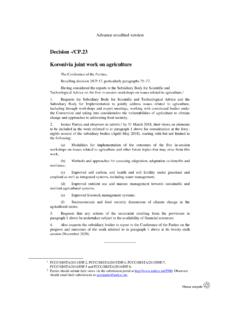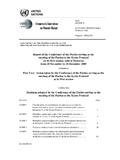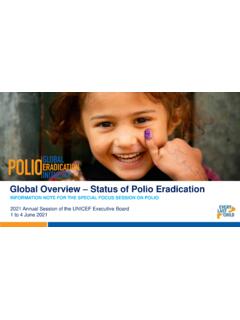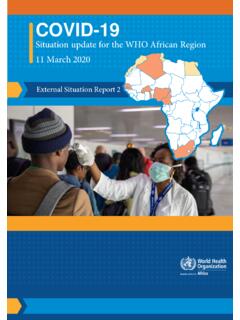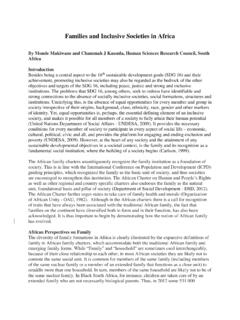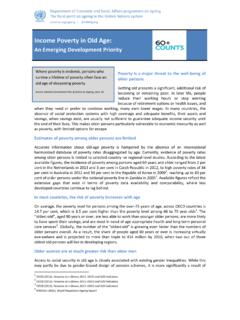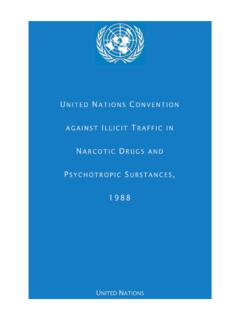Transcription of small island developing States - United Nations Framework ...
1 Climate changesmall island developing StatesUNFCCC (2005) climate change, small island developing by the CLIMATE CHANGE SECRETARIAT (UNFCCC), Bonn, and rightsThis guide is issued for public information purposes and is not anofficial text of the Convention in any legal or technical otherwise noted in captions of graphics all matter may befreely reproduced in part or in full, provided the source isacknowledged. UNFCCC 2005 all rights reservedISBN 92 9219 012 1 For further information contact:Climate Change Secretariat (UNFCCC)Martin-Luther-King Strasse 853175 Bonn, Germanyt. +49 228 815 1000f. +49 228 815 The Maldives is one ofthe small States .
2 Weare not in a position tochange the course ofevents in the what you do or donot do here willgreatly influence thefate of my people. Itcan also change thecourse of worldhistory. Statement by Maumoon Abdul Gayoom(Maldives)4 December 1997, Kyoto, Japan (COP 3)ForewordSince the negotiations that led to the United NationsFramework Convention on Climate Change began, one groupof Parties has been particularly active and vocal: the smallisland developing States , or is climate change so important to SIDS? The answer issimple: these small Nations are among the most vulnerableto climate change impacts, which will become critical if noappropriate action is taken.
3 Many islands are threatened byrising sea levels. Another growing concern is the increasingnumber and severity of extreme weather events with allthey entail in terms of loss of life and damage to propertyand infrastructure that can easily cripple small are among the Parties least responsible for climatechange and are dependent on others to ensure thatsignificant action is taken in support of the , they strive not only to support the processdirectly but also to ensure that proper international action istaken to limit emissions of greenhouse gases and to adapt toclimate publication highlights the SIDS participation in theConvention as well as some of the ongoing needs andconcerns that they have expressed in the course of theUNFCCC reading!
4 Joke Waller Hunter, Executive Secretary, UNFCCCC ontentsSmall island developing States and climate change1A profile of SIDS 4 Financial and technical support for SIDS 7 Contributions to global warming 10A special vulnerability to climate change 13 Potential impacts of climate change 16-Water resources- The coastal environment- Agriculture and food security-Biodiversity-Human settlements and infrastructure- Human health- Economic and socio-cultural resourcesAdaptations and constraints to developing 24adaptive capacity- Inadequate data or information and technical capacity for timely and effective adaptation planning- Weak institutional
5 Capacity- Limited financial resources small island developingStates and climate change It is a particular honour, Madame,as amongst our membership aremany countries that have been firstmovers in the internationalresponse against climate include:- Maldives, host to one of the firstMinisterial Declarations on theImpacts of Climate Change;- Malta, sponsor of the UN GeneralAssembly Resolution thatlaunched the Conventionnegotiations;-Vanuatu, who submitted the firstoutline of elements for aConvention;- Mauritius, the first state to ratifythe Convention, followed quicklyby Seychelles and the MarshallIslands;-Trinidad and Tobago, sponsor ofthe AOSIS protocol that spurredthe Berlin Mandate process;- Fiji and Antigua and Barbuda, thefirst to ratify the Kyoto Protocol;and the many island States whosedelegations work tirelessly in thisprocess to defend the front line inthe battle against global warming.
6 Statement by T. Neroni Slade (Samoa on behalf of AOSIS)12 November 1998, Buenos Aires, Argentina (COP 4)1 small island developing States (SIDS) have long beenrecognized by the international community as a specialcase whose needs and concerns have to be addressed (seebox 1). Although these countries are among the leastresponsible for climate change, they are likely to suffermost from its adverse effects and could in some caseseven become uninhabitable. This is what makes them aspecial case requiring the help and attention of theinternational SIDS are currently Parties to the United NationsFramework Convention on Climate Change (UNFCCC), and29 are also signatories to the Kyoto Protocol.
7 Many SIDSare members of the Alliance of small island States (AOSIS),and 11 are listed as least developed countries (LDCs). Seefigure 1 for an illustration of how small island Nations are represented in the various negotiating groups of theUNFCCC. SIDS have not only focused their attention on negotiationsof the UNFCCC and its Kyoto Protocol over the course ofthe past 10 years; they have also taken a lead inimplementing the 1. small island developing States in the international arenaThe unique situation of small island developing States (SIDS) wasacknowledged at the United Nations Conference on Environment andDevelopment in Rio de Janeiro in 1992.
8 Governments agreed thatconcerted action was needed to address development for the sake offuture 1994, in Barbados, the Global Conference on the SustainableDevelopment of small island developing States included specificactions and measures at the national, regional and international levelsin support of sustainable development. The particular vulnerability ofSIDS to climate change, climate variability and sea-level rise featuredprominently in the Barbados Programme of Action, which identifiedpriority areas and indicated the specific actions needed to address thespecial challenges faced by the governments of these urgency for action to address the special needs of SIDS byimplementing the Barbados Programme of Action and the outcome ofthe twenty-second special session of the General Assembly were bothrecognized by the United Nations Millennium Summit in 2000.
9 Whengovernments pledged to address the special needs of SIDS rapidly andin full by 2015. The Summit also urged the international community toensure that, in the development of a vulnerability index, the specialneeds of SIDS were taken into 2002, the World Summit on Sustainable Development highlightedthe fact that SIDS are a special case both for environment and fordevelopment by stating that although the governments of thesecountries continue to take the lead in the path towards sustainabledevelopment in their countries, they are increasingly constrained by theinterplay of numerous adverse meet their obligations under the UNFCCC.
10 All Partiesmust report in national communications information oncircumstances related to the achievements of the objectiveof the Convention and must detail their greenhouse gas(GHG) emissions as well as efforts to address climatechange and report on their vulnerability and adaptationoptions. SIDS were among the first to complete initial nationalcommunications and submit them to the Conference ofthe Parties (see figure 2). This report is based on theinformation provided in those national communications aswell as from reports of the Intergovernmental Panel onClimate Change and the Global Environment Facility andother regional and bilateral financial and technical and the PacificLatin America and the CaribbeanOtherSubmission of initial national communication by region and by yearNo.

